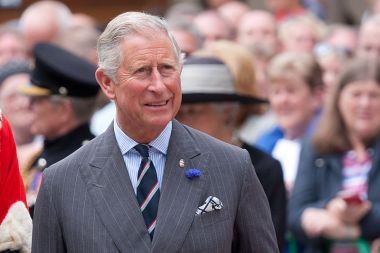Prince of Wales condemns 'grotesque and barbarous assault' on Middle East Christians

The Prince of Wales has condemned the persecution of Christians in the Middle East as "the most soul-destroying tragedy" and as a "grotesque and barbarous assault".
Speaking today at London's Armenian cathedral, he said the persecution in the Middle East in countries where Armenian Christians have long lived peacefully with their neighbours was "literally heartbreaking".
Prince Charles spoke out in particular against the "mindless brutal destruction" by Jabhat al-Nusra Islamists of the Armenian church in Deir el-Zour in Syria, which was dedicated to the one and a half million Armenians murdered by the Turks in 1915. The loss included archives from as early as 1841 and during the attack, the remains of hundreds of genocide victims were taken from the crypt and desecrated by being scattered on the ground outside the church.
In a further atrocity, a 1,800-year-old church in Mosul, Iraq's second largest city, was destroyed by Islamic State earlier this year. The church was believed to house the tomb of the biblical prophet Jonah. The city's Christians had already fled the city after being ordered either to convert to Islam, pay a tax, leave or be murdered.
The Prince of Wales said: "As I have said before along with so many others I have been deeply distressed by the appalling, nightmare faced by Christians, and other minority communities in various parts of the Middle East. Every week I receive, see letters from people who are gravely concerned about the persecuted church in the Middle East. Our prayers for those who have to endure this continuing horror, seem so hopelessly inadequate under such dreadful circumstances, but please, please just know how truly heartfelt they are."
The Prince of Wales has worked ceaselessly to encourage inter-faith dialogue and a greater understanding between faiths.
His visit to St Yeghiche Armenian Church in Kensington followed his address in December last year when he spoke passionately about the challenges facing Christians in some Middle-Eastern nations. At that point, he visited the Coptic Orthodox Church Centre in Stevenage and the Syrian Orthodox Church in Acton.
Archbishop of Iraq Avak Asadourian said that until relatively recently Iraq had been a good and innocent place to live. The coup of 1958 followed by four wars since 1980 had destroyed the fabric of Iraqi society.
"The last of these was the ill-advised war of 2003. For 11 years now we have had a destroyed infra-structure," said the Archbishop, describing high-level corruption, a school system that has broken down and ongoing violence between rival sects as the conditions Iraqis live under now.
While in 1980 there were about 1.5 million Christians in Iraq, there are now about 400,000 and numbers continue to dwindle.
"If political measures are not adopted very soon, then Christianity in its eastern manifestation will cease to exist in its own birthplace. If this comes to pass, how sad it will be for all of us."
Armenians in Syria, where they have been settled since 1915, have also become a target during the fighting there with schools and churches vulnerable to arson attacks. Many Armenians have fled from Syria back to Armenia. The Diocese of the Armenian Church of the UK and Ireland has raised £15,000 to help the Armenians of Syria during the past year.
The Prince of Wales visited Armenia in May 2013. The cathedral is one of two Armenian churches in London, St Yeghiche and St Sarkis, also in Kensington. St Yeghiche, formerly known as St Peter's, is a former Anglican Church which was closed in around 1973 and taken over by the Armenians in 1998. It has been restored and refurbished and is now an extraordinarily beautiful Victorian neo-gothic gem with a seating capacity of 1,000.
The first Armenian Church built in the UK is the Holy Trinity Church in Manchester which was built and consecrated in 1860.











